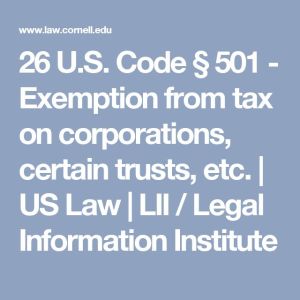
Section 401(a) provides that a trust created or organized in the United States and
forming a part of a stock bonus, pension, or profit-sharing plan of an employer for the exclusive benefit of its employees or their beneficiaries is qualified if it meets certain requirements. Section 401(a)(1) provides that one of these requirements is that contributions be made to the trust by the applicable employer or employees, or both, for the purpose of distributing to such employees or their beneficiaries the corpus and income of the fund accumulated in accordance with such plan.
Section 501(a) provides, in part, that a trust described in § 401(a) is exempt from income tax. Section 401(a)(2) provides, in part, that under each trust instrument it must be impossible, at any time prior to the satisfaction of all liabilities with respect to employees and their beneficiaries under the plan and the trust, for any part of the corpus or income of the trust to be used for or diverted to purposes other than for the exclusive benefit of the employees or their beneficiaries.
Similarly, § 408 provides that an IRA means a trust created or organized
“for the exclusive benefit of an individual or his beneficiaries” and § 457(g) provides that the assets of an eligible governmental plan under § 457(b) must be held in trust “for the exclusive benefit of participants and their beneficiaries.”
Section 401(a)(24) provides that any group trust that otherwise meets the
requirements of § 401(a) does not fail to satisfy such requirements due to the
participation or inclusion of the monies of a plan or governmental unit described in § 818(a)(6) in the group trust. Section 818(a)(6) contains special rules regarding the definition of the term “pension plan contract.” Section 818(a)(6)(A) defines the term to include a contract purchased by a governmental plan (within the meaning of § 414(d)) and an eligible governmental plan under § 457(b).
Section 818(a)(6)(B) further defines the term to include a contract purchased by the Government of the United States, the government of any state or political subdivision thereof, or by any agency or instrumentality of the foregoing, or any organization (other than a governmental unit) exempt from tax under subtitle A (income taxes), for use in satisfying an obligation of such government, political subdivision, agency, instrumentality, or organization to provide a benefit under a plan described in § 818(a)(6)(A).1
Section 401(f)(1) provides that a custodial account, an annuity contract, or a
contract (other than a life, health or accident, property, casualty, or liability insurance contract) issued by an insurance company qualified to do business in a State is treated as a qualified trust under § 401 if the custodial account or contract would constitute a qualified trust under § 401, except for the fact that it is not a trust. Section 401(f)(2)
1 The Tax Equity and Fiscal Responsibility Act of 1982 (TEFRA), Pub. L. No. 97-248, added § 401(a)(24) to the Code. With respect to that section, the TEFRA conference report explains that “the tax-exempt status of a group trust will not be adversely affected merely because the trust accepts monies from (a) a retirement plan of a State or local government, whether or not the plan is a qualified plan and whether or not the assets are held in trust, or (b) any State or local government monies for use in satisfying an obligation of such State or local government to provide a retirement benefit under a governmental plan.” H.R. Conf. Rep. No. 760, 97th Cong., 2nd Sess. 81, 1982-2 C.B. 682.







